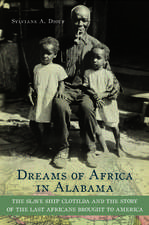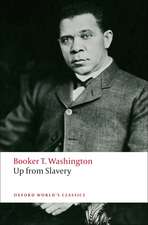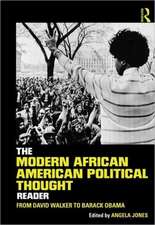Understanding African American Rhetoric: Classical Origins to Contemporary Innovations
Editat de Ronald L. Jackson II, Elaine B. Richardsonen Limba Engleză Paperback – 4 apr 2003
The essays in this volume neither seek to displace Western Rhetoric, nor function as an uncritical paen to Afrocentricity and Africology. This volume is both timely and essential; timely in advancing a better understanding of the richly textured history that is expressed through African American discourse, and essential as a counterpoint to the hegemonic influence of Greek and Roman rhetoric as the origin of rhetorical theory and practice.
Written in the spirit of a critical rhetoric, this collection eschews traditional focus on public address and instead offers a rich array of texts, in musical and other forms, that address publics.
Preț: 454.78 lei
Nou
Puncte Express: 682
Preț estimativ în valută:
87.04€ • 93.96$ • 72.99£
87.04€ • 93.96$ • 72.99£
Carte tipărită la comandă
Livrare economică 18 aprilie-02 mai
Preluare comenzi: 021 569.72.76
Specificații
ISBN-13: 9780415943871
ISBN-10: 0415943876
Pagini: 346
Dimensiuni: 178 x 254 x 22 mm
Greutate: 0.74 kg
Ediția:1
Editura: Taylor & Francis
Colecția Routledge
Locul publicării:Oxford, United Kingdom
ISBN-10: 0415943876
Pagini: 346
Dimensiuni: 178 x 254 x 22 mm
Greutate: 0.74 kg
Ediția:1
Editura: Taylor & Francis
Colecția Routledge
Locul publicării:Oxford, United Kingdom
Public țintă
Postgraduate and UndergraduateNotă biografică
Ronald L. Jackson II is Associate Professor of Culture and Communication Theory at Pennsylvania State University. He is the author of The Negotiation of Cultural Identity (1999). Elaine B. Richardson is Assistant Professor of English and by courtesy, Applied Linguistics at Pennsylvania State University. She is the author of African-American Literacies (Routledge, 2002).
Recenzii
"Understanding African American Rhetoric is the most comprehensive, scholarly, methodologically sound presentation of African American rhetoric to date! Given the many leading intellectuals who wrote chapters, this book is essential reading for both scholars and practitioners. It is likely to become a canonical text." -- Jack L. Daniel, co-author, with Omari C. Daniel, of We Fish: The Journey to Fatherhood
Cuprins
Introduction, Ronald L. Jackson, Elaine B. Richardson; Classical Egyptian Origins of African American Rhetoric; Chapter 1 Nommo, Kawaida, and Communicative Practice, Maulana Karenga; Chapter 2 The Spiritual Essence of African American Rhetoric, Adisa A. Alkebulan; Manifestations of African American Rhetoric and Orality; Chapter 3 African American Orality, Thurmon Garner, Carolyn Calloway-Thomas; Chapter 4 “Jesus Is a Rock”, Melbourne S. Cummings, Judi Moore Latta; Chapter 5 The Use of Public Space as Cultural Communicator, Deborah F. Atwater, Sandra L. Herndon; Politics of Defining African American Rhetoric; Chapter 6 The Word at Work, Richard L. Wright; Chapter 7 The Politics of (In)visibility in African American Rhetorical Scholarship, Mark Lawrence McPhail; Chapter 8 Afrocentricity as Metatheory, Ronald L. Jackson II; African American Rhetorical Analyses of Struggle and Resistance; Chapter 9 Africological Theory and Criticism, Jeffrey Lynn Woodyard; Chapter 10 Every Man Fights for His Freedom, Ella Forbes; Chapter 11 “The Duty of the Civilized Is to Civilize the Uncivilized”, Felicia M. Miyakawa; Chapter 12 Death Narratives from the Killing Fields, Carlos D. Morrison; Trends and Innovations in Analyzing Contemporary African American Rhetori; Chapter 13 Lauryn Hill as Lyricist and Womanist, Celnisha L. Dangerfield; Chapter 14 The Kink Factor, Regina E. Spellers; Chapter 15 An Afrocentric Rhetorical Analysis of Johnnie Cochran’s Closing Argument in the O.J. Simpson Trial, Felicia R. Walker; Chapter 16 Afrocentric Rhetoric Transcending Audiences and Contexts, Shauntae Brown-White; Visions for Research in African American Rhetoric; Chapter 17 The Future of African American Rhetoric, Molefi Kete Asante; Chapter 18 The Discourse of African American Women, Dorthy L. Pennington;
















